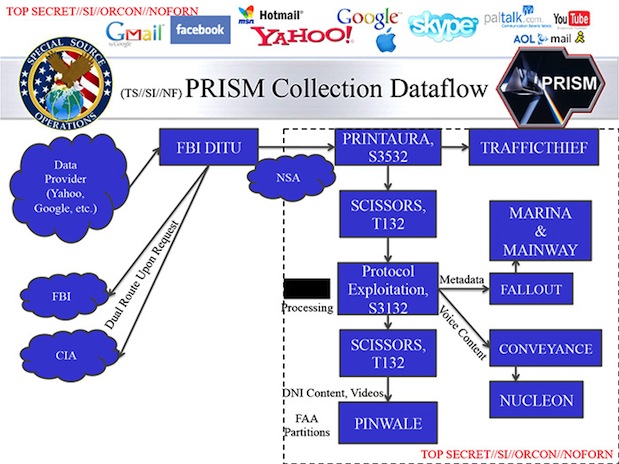Washington Post reveals new PRISM slides, offers greater clarity into the US’ surveillance operation
The surveillance story that started with four leaked slides from the Washington Post, today gets a bit clearer. The publication has revealed four more annotated slides about the once-secret NSA operation, along with detailing the various levels of scrutiny from the FBI and NSA that happen before, during and after approved wiretaps take place. It seems that many of the measures make sure the warrantless data mining of US citizens occurs to the smallest extent possible and that FISA rules are followed — still unsettling, nonetheless.
Detailing the process further, NSA analysts perform checks with supervisors to be certain intended targets are foreign nationals who aren’t on US soil; approval is provided by way of “51-percent confidence” in assessments. During a “tasking process” search terms are entered, dubbed “selectors,” which can tap into FBI gear installed within the private properties of participating companies — so much for those denials. For live communications, this data goes straight to the NSA’s PRINTAURA filtering system, while both the FBI and NSA scan pre-recorded data independently. Notably, live surveillance is indeed possible for the likes of text, voice and and instant message-based conversations, according to a slide that details how cases are notated. It’s also worth mentioning that much of the collected metadata comes from programs outside of PRISM, as WP points out.
PRINTAURA is an overall filter for others, like NUCLEON for voice communications and MAINWAY for records of phone calls. Another two layers beyond that, called CONVEYANCE and FALLOUT, provide further filtering. Again, all of these checks apparently fine-tune results and help make sure they don’t match up with US citizens. Results that return info about those in the US get scrapped, while those that have info about foreign targets mixed with US citizens get stored for up to five years — restrictions are in place to limit the snooping of citizens. A total number of 117,675 active targets were listed as April 5th, but the paper notes that this doesn’t reflect the amount of data that may also have been collected on American citizens in the process. If you haven’t already, now might be a great time to catch up on this whole PRISM fiasco to learn about how it might affect you. You’ll find all the new slides and more detailed analysis at the source links.
Detailing the process further, NSA analysts perform checks with supervisors to be certain intended targets are foreign nationals who aren’t on US soil; approval is provided by way of “51-percent confidence” in assessments. During a “tasking process” search terms are entered, dubbed “selectors,” which can tap into FBI gear installed within the private properties of participating companies — so much for those denials. For live communications, this data goes straight to the NSA’s PRINTAURA filtering system, while both the FBI and NSA scan pre-recorded data independently. Notably, live surveillance is indeed possible for the likes of text, voice and and instant message-based conversations, according to a slide that details how cases are notated. It’s also worth mentioning that much of the collected metadata comes from programs outside of PRISM, as WP points out.
PRINTAURA is an overall filter for others, like NUCLEON for voice communications and MAINWAY for records of phone calls. Another two layers beyond that, called CONVEYANCE and FALLOUT, provide further filtering. Again, all of these checks apparently fine-tune results and help make sure they don’t match up with US citizens. Results that return info about those in the US get scrapped, while those that have info about foreign targets mixed with US citizens get stored for up to five years — restrictions are in place to limit the snooping of citizens. A total number of 117,675 active targets were listed as April 5th, but the paper notes that this doesn’t reflect the amount of data that may also have been collected on American citizens in the process. If you haven’t already, now might be a great time to catch up on this whole PRISM fiasco to learn about how it might affect you. You’ll find all the new slides and more detailed analysis at the source links.

Comments
Post a Comment